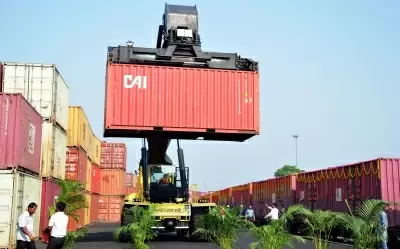India emerging as an alternative destination for relocating Chinese industries
New Delhi
30-March-2022

Photo: IANS
With gradual expansion of the capacity of its local sourcing and distribution networks accompanied by provision of key incentives and regulatory relaxations to foreign investors, India is on its way to reshape the global supply chain and become an alternative to China.
Earlier, to enhance the resilience of supply chains in the Indo-Pacific region, the trade and economy Ministers of India, Japan and Australia launched the Supply Chain Resilience Initiative (SCRI) on April 27, 2021, which aims to develop dependable sources of supply and attract investment.
UBS, a financial services company based in Switzerland, forecasted in February 2020 that India can become a preferred destination for companies looking to shift from China, and to diversify their supply chain.
India has identified a dozen of sectors where global supply-chains can shift away from China. These sectors include energy, automobiles, steel, pharma, textiles and garments, marine products, financial services, IT services and tourism, etc.
To avoid the manufacturing and supply chain disruptions, global companies are looking to diversify their strategy and India stands to gain from this move which will also break the concentrated supply chain in China. With the 'Make in India' programme, India has started to produce electronics, electrical goods, solar panels, chemicals, bulk drugs, metals, furniture, household/gifts items, toys, footwear, hardware, automobile components, tires, bicycle parts, bearings and machinery, etc.
Some India-based businesses have also set up domestic sourcing and distribution networks in order to de-risk from China, and to drive manufacturing costs down. In view of this, the Indian government in subsequent budget provisions increased import duties on certain electronic components to set up a less vulnerable supply chain in the country itself.
Watch This TWL Video
Not only local firms, but foreign companies with a base in India have also started local production to reduce reliance on imports and focussing on large scale indigenization. Chinese smart-phone maker Vivo had set up a manufacturing facility in Greater Noida. Similarly, South Korean multinational company Samsung had set up India's first smart-phone display manufacturing unit in Noida. It is likely to play a key role in the imminent major reshuffle of the global supply chain.
At present, there are 1,455 Japanese companies operating in India and 11 Japan Industrial Townships (JIT) have been established, including Neemrana in Rajasthan and Sri City in Andhra Pradesh, hosting the maximum number of Japanese manufacturing companies. Japan is also India's 5th largest source of FDI, besides being the largest development partner.
Further, due to rising labour costs in China, overseas businesses are keen to set up a local supply chain in India. According to industry experts, the entry level salaries for workers in India start between Rs 12,000 ($157) and Rs 15,000 ($196), while the same in China are about three times higher.
Against this backdrop, given India's competitive advantage in terms of land and labour availability as well as software skills, global manufacturers long settled in China are looking to diversify their manufacturing bases to India even as the current Covid crisis underscores the importance of moving away from dependency on a single economy like China. - IANS
More Headlines
Indian Startup Founder Salaries Drop 25% Amid Funding Winter
DMK to Launch Statewide Protests Against NEP’s Three-Language Formula
Air India Faces Backlash as Elderly Passenger Denied Wheelchair Falls, Lands in ICU
Shiv Nadar Transfers 47% Stake in HCL Promoter Firms to Daughter Roshni
Telangana Cabinet decides to develop Future City on 30,000 acre
Indian Startup Founder Salaries Drop 25% Amid Funding Winter
DMK to Launch Statewide Protests Against NEP’s Three-Language Formula
Air India Faces Backlash as Elderly Passenger Denied Wheelchair Falls, Lands in ICU
Shiv Nadar Transfers 47% Stake in HCL Promoter Firms to Daughter Roshni
Telangana Cabinet decides to develop Future City on 30,000 acre










